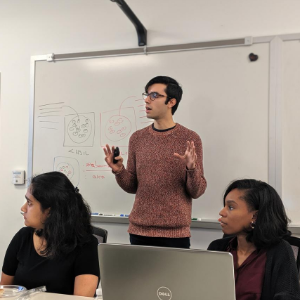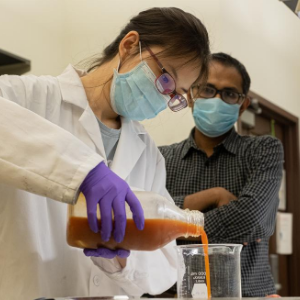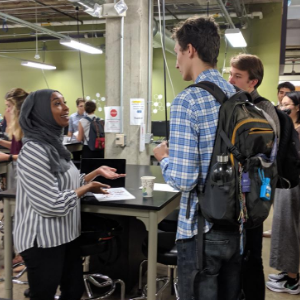
The bioengineering field integrates skills across the physical and life sciences, mathematical and computational sciences, and medicine. Many Rice bioengineering students attend local and national conferences, symposium events, and design competitions to present their research and design projects. They also author or co-author a manuscript(s), and earn awards at local and national conferences. Students who participate and excel in independent research or engineering design are recognized through engineering programs and competitions.
Highly competitive national awards bioengineering students have received within the last decade for undergraduate research include 17 National Science Foundation Graduate Research Fellowships, 11 Goldwater Scholarships, 4 Hertz Fellowships, 6 Whitaker International Fellowships, 3 Marshall Scholarships, 3 Fulbright Scholarships, 1 Beckman Scholarship, 1 Morris K. Udall Scholarship, and 1 Truman Scholarship.
Student teams have also received top engineering design grants and awards at global health and national competitions to advance their prototype or help them forge a path that leads to the deployment of a manufactured product. This has included 9 Saving Lives at Birth: A Grand Challenge for Development and three VentureWell grants.
Research Opportunities
To be successful, students should begin to proactively identify their interest areas and search for faculty mentors as early as their freshman year. Research opportunities in bioengineering involve cutting-edge projects in our focus areas, including biomaterials and drug delivery, biomedical imaging and diagnostics, cellular and biomolecular engineering, computational and theoretical bioengineering, systems and synthetic biology, and tissue engineering and biomechanics.

Over 70% of Rice bioengineering undergraduates participate in research either in faculty member laboratories, in research centers and institutes at Rice, or in the Texas Medical Center.
The Center for Civic Leadership (CCL) offers multiple curricular and experiential learning opportunities that enhance bioengineering research and engineering design, such as the Discover Research Fair, and the Rice Undergraduate Research Symposium (RURS), which sponsors the Century Scholars Program for freshmen and the Undergraduate Scholars Program for upperclassmen.
Bioengineering faculty and students also benefit from Rice's many research centers, institutes, and groups.
Undergraduate research courses (BIOE 400/401)
These courses are offered for undergraduate students who want to get involved in research. Through this course students perform an independent investigation of a specific topic or problem in modern bioengineering research. Under the direction of a selected faculty member, students gain hands-on research experience in a bioengineering laboratory. Students are often mentored by graduate students or postdoctoral fellows in the lab.
Engineering Design

Rice's Oshman Engineering Design Kitchen (OEDK) has many project-based courses that teach engineering design. Some of these courses are capstone design projects for seniors, underclassmen design courses and other courses taught in the OEDK. The minor in Global Health Technologies (GLHT) and an Engineering Design minor complement existing BS and BA degree programs in the George R. Brown School of Engineering and are open to students earning a major in any department in the school of engineering.
Bioengineering design courses follow a systematic process in which students learn and work with faculty members at the OEDK, researchers, professionals in industry, or clinicians and health care professionals in the Texas Medical Center, who serve as project sponsors as students complete a prototype; conduct tests and safety evaluations; and follow FDA requirements and logistics, engineering ethics, intellectual property rights, business planning and marketing, and/or publication.
Courses include:
- Capstone design projects for seniors (BIOE 451 and 452),
- Introduction to Engineering Design for freshman or underclassmen
(ENGI 120 and ENGI 220), - Engineering Design Studio (ENGI 200),
- Prototyping and Fabrication (ENGI 210), and
- Engineering Design Workshop (ENGI 300).
Internships & Professional Development
Many bioengineering students take on real-world challenges and strengthen their classroom studies through summer internships or study abroad programs, professional mentorship, and accelerator startup/entrepreneurship programs. Examples include:
- International engagement through Rice 360° Global Health Technologies Summer Internship program. The summer internships are held in a number of national and international locations, exposing students to health care challenges and solutions in the developed and developing world.
- The Summer Cardiovascular Research Internship Program (SCRIP) offers a unique opportunity for undergraduates to perform cutting-edge cardiovascular research ranging from fundamental science and translational medicine to community health.
- New entrepreneurship programs, such as the Liu Idea Lab for Innovation and Entrepreneurship (Lilie) and OwlSpark, add project-based courses and startup mentorship while building a business acumen. The Startup Career Fair is a one-day event that connects local startups with entrepreneurial-minded students seeking internships and experienced professionals pursuing full-time opportunities.
- The Center for Civic Leadership combines academic rigor, experiential learning, and volunteer service through programs such as Engineers Without Borders.
- The Doerr Institute for New Leaders provides tailored leadership coaching to students.
- In partnership with Doerr Institute for New Leaders, the Smalley-Curl Institute (SCI) recruits undergraduate students to work on research projects with graduate mentors in its SCI-STAR program.
- The Rice Center for Engineering Leadership (RCEL) provides focused academic training and real-world problem-solving. Students can earn an RCEL Certificate in Engineering Leadership, the only four-year engineering leadership certificate in Texas and one of only a handful of educational innovations like it in the United States.
- The Center for Career Development offers enhanced programs, services, and resources to guide students pursuing career goals. The Owl Edge Career Mentoring Program matches alumni and students for externships and internships.
